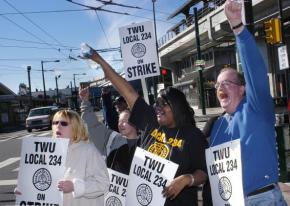Philadelphia transit strikers push back
reports on a tentative contract agreement that ended a six-day strike by Philadelphia transit workers, with most of the strikers' demands met.
PHILADELPHIA--Transit workers for the Southeastern Pennsylvania Transportation Authority (SEPTA) returned to work after a six-day strike that brought all of Philadelphia's subway, bus and trolley operations to a halt.
The 5,100 members of the Transport Workers Union (TWU) Local 234 have been working without a contract since March and are scheduled to vote later this month on the agreement between SEPTA and TWU officials that ended the strike.
From the beginning of contract negotiations, SEPTA pushed hard for Local 234 to accept concessions. The company's original offer included wage freezes for two years, increases in worker contributions to health care and pension benefits, and an end to "picking rights," which allow workers with seniority to choose the equipment they drive. For months, SEPTA refused any revisions of their offer until the TWU's threat of strike became real.
The current offer that awaits ratification by Local 234 membership includes a $1,250 signing bonus, wage increases of 2.5 percent in the second year, and 3 percent in the final three years of the five-year contract. The workers will also maintain the picking rights they've held onto for many years. There will be no increase in worker contributions to health care, and members will also benefit from increases in dental coverage.

However, SEPTA management was able to win one important concession in the contract--increasing the transit workers' pension contributions from 2 to 3.5 percent of their income. This will offset some of the wage increases won in the contract that would allow income to keep pace with cost-of-living increases.
SEPTA benefited from the backing of Mayor Michael Nutter and Gov. Ed Rendell, who called SEPTA's offers "sensational" given the state of the economy. The local media played their part by criticizing TWU workers for being greedy for not agreeing to cuts that many other workers have recently been forced to accept.
But while SEPTA used the bad economy to push for concessions, they certainly haven't been hurting financially. Ridership is up overall in recent years, while the company has received increased funds from the state and recently was awarded a $200 million federal stimulus grant.
That Local 234 responded to SEPTA's demands with a strike also shouldn't come as a surprise given the union's long and militant history of struggle for fair contracts. The 2009 strike was their ninth since 1975. To increase the impact of the strike on SEPTA, some TWU pickets near transit hubs outside of Philadelphia successfully blocked SEPTA buses and trolleys from operation by another union.
TWU's success in winning a better contract could have an impact on other workers in Philly currently working without a contract, including firefighters and municipal employees. On the final day of the strike, members of AFSCME District 47 leafleted outside of City Hall, demanding that Nutter move forward with contract negotiations and encouraging workers to take the Friday off that week in protest.
With bosses and politicians across the country using the recession to demand layoffs and cuts, actions like Local 234's strike will be needed to put forward an opposition.


